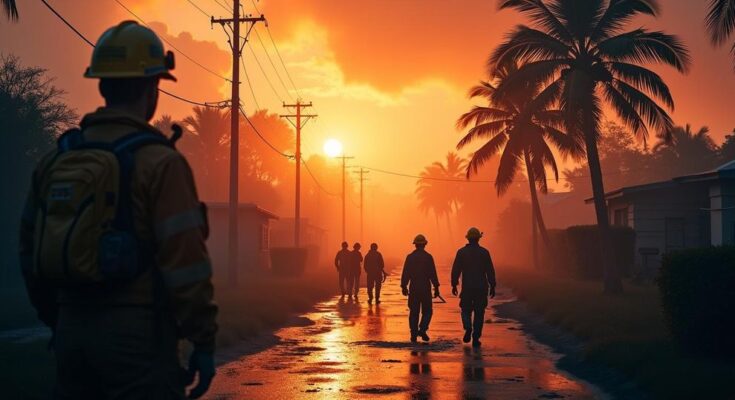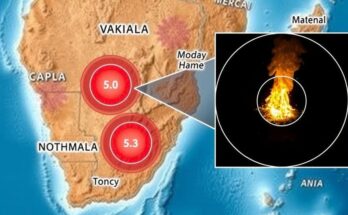The death toll from Hurricane Helene has exceeded 150, with significant destruction across the Southeastern US. President Biden and Kamala Harris are surveying the damage in North Carolina, South Carolina, and Georgia. Emergency services are working to restore power and find missing individuals amidst the chaos. Political reactions highlight the connection between climate change and the storm’s impact.
The catastrophic impact of Hurricane Helene has resulted in a harrowing death toll that has surpassed 150 individuals across the Southeastern United States. Rescue teams are employing helicopters to access remote areas that have suffered significant destruction, as they continue their search for survivors. The storm forced Democratic presidential candidate Kamala Harris to visit Georgia on Wednesday to assess the devastation, with President Joe Biden set to visit North Carolina and South Carolina as well. As of Tuesday, reports indicated that the death toll had risen to at least 155, with North Carolina suffering the most, tallying at least 74 fatalities, followed by South Carolina with 36, Georgia with 25, Florida with 14, Tennessee with four, and Virginia with two. Emergency crews are working tirelessly to restore vital services, and unfortunately, hundreds of individuals remain unaccounted for, although officials are optimistic that some may still be located once cell phones are operable again. Governor Roy Cooper of North Carolina expressed the extent of the catastrophe, stating, “We know that the devastation brought by hurricane Helene is beyond belief. Communities were wiped off the map,” while acknowledging the challenges faced in restoring services. Buncombe County, particularly impacted, reported 57 deaths, reinforcing the region’s dire situation. In light of the storm’s destruction, significant political commentary has emerged, with Trump criticizing the Biden-Harris administration’s response. In a sharp rebuttal, President Biden stated that climate change is undoubtedly responsible for the destruction wrought by Helene: “Absolutely, positively, unequivocally, yes, yes, yes, yes,” he asserted. The storm struck as a Category Four hurricane on Florida’s Gulf Coast, demonstrating the alarming trends associated with increasingly powerful hurricanes in a warming world.
Hurricane Helene struck the Southeastern United States, leaving a trail of destruction and a substantial death toll. Initially making landfall as a Category Four hurricane, Helene’s winds reached speeds of 140 miles per hour, damaging infrastructure and uprooting communities. The Federal and State responses involve high-level political figures, showcasing the significance of the hurricane not only in terms of immediate disaster management but also within the context of the upcoming presidential election, where the recovery efforts are critical in gauging public sentiment. With climate change increasingly linked to more severe weather patterns, the political discourse surrounding natural disasters has become increasingly relevant as candidates position themselves ahead of the November elections.
In summary, Hurricane Helene’s devastation has resulted in at least 155 fatalities across multiple states in the US, with substantial rescue efforts underway. Both political leaders are making significant campaign visits to assess and respond to the damage, while scientists and policymakers reflect on the implications of climate change in exacerbating such natural disasters. The recovery efforts from this tragic event will likely have profound implications not only for the affected communities but also for the political landscape leading to the upcoming elections.
Original Source: www.france24.com




